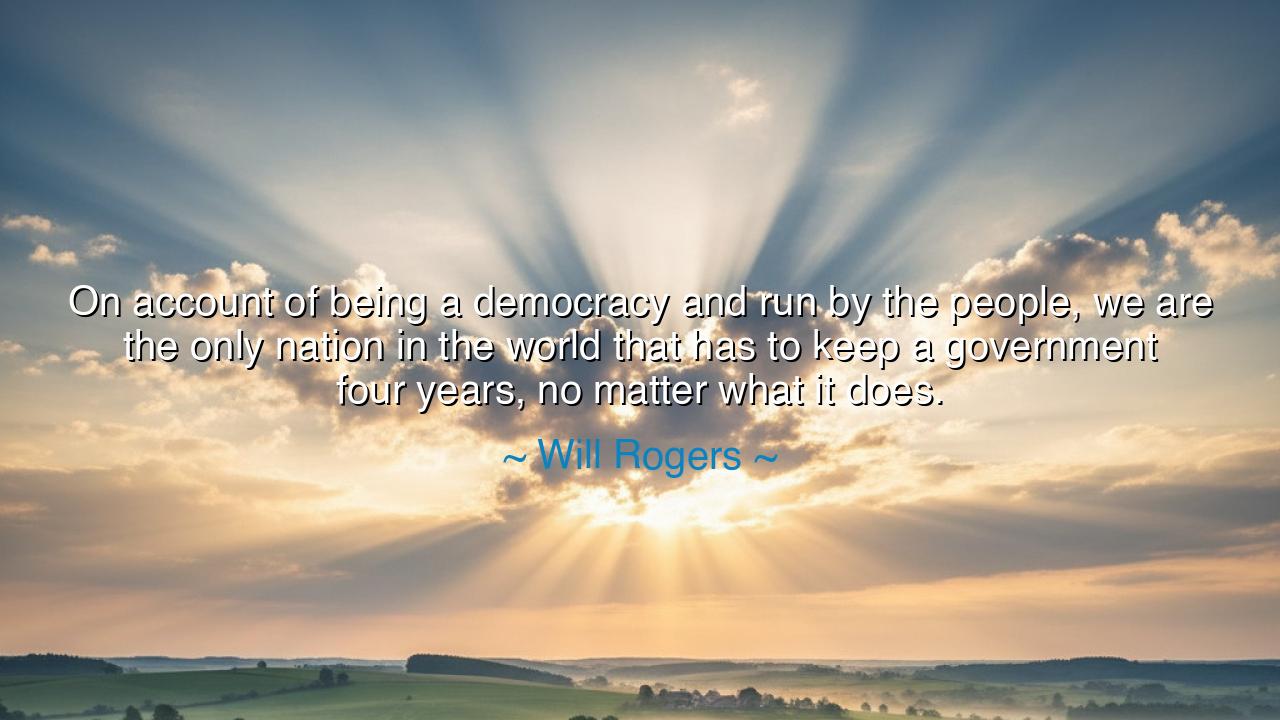
On account of being a democracy and run by the people, we are the
On account of being a democracy and run by the people, we are the only nation in the world that has to keep a government four years, no matter what it does.






The words of Will Rogers—the homespun philosopher of America’s heart—carry both laughter and lament: “On account of being a democracy and run by the people, we are the only nation in the world that has to keep a government four years, no matter what it does.” Behind this jest lies a truth deep and enduring, as sharp as it is wise. Rogers, with the humor of a sage disguised as a jester, spoke not to mock democracy but to remind its children of its burdens. His words are the mirror of self-rule, showing both its beauty and its cost—the glory of freedom, and the frustration of patience.
This quote was born in the early years of the twentieth century, a time when the American Republic was both proud and weary. Rogers lived through wars, depressions, and dizzying change. He watched presidents rise as heroes and fall as scapegoats. Yet through all of it, he understood that democracy was a compact between ruler and ruled, where the people themselves were both the master and the servant. In monarchies, kings could be deposed by coup or blade; in dictatorships, power could be seized by force. But in a democracy, as Rogers said with a grin, the people must wait for the next election—for even when discontent boils, the rule of law demands endurance. The ballot box, not the sword, is the instrument of change.
In the ancient style, we may liken Rogers’ humor to the wisdom of the Stoics, who taught that freedom requires discipline and endurance. He reminds us that democracy is not a system for the impatient. Its power lies not in haste, but in process—in the willingness of citizens to trust in time, to bear with imperfection, and to correct their course with deliberation rather than destruction. “We have to keep a government four years,” he says, not in despair, but as a sober recognition of the cost of self-government. For the people, once they have chosen their leaders, must live with the fruit of their own choice until the appointed season of renewal. Such is the price of liberty: not chaos, but commitment.
History gives us many examples of this truth. During the Great Depression, when poverty stalked the land and faith in government faltered, the people of America endured with patience. Many cursed President Hoover, but they did not storm his palace nor shatter their institutions. They waited, and in time, Franklin D. Roosevelt rose to lead them toward hope. Rogers, who knew them both, saw in that waiting the moral strength of a free people—the belief that even when their leaders fail, their system endures. For in democracy, the people are never without power; they merely must learn to wield it not with rage, but with wisdom.
Yet Rogers’ humor also conceals a challenge. His jest reminds us that democracy demands more than patience—it demands participation. “Run by the people,” he said, and by that phrase he places the weight of responsibility squarely upon the citizen. If the government does ill, it is not some distant monarch to be blamed—it is the reflection of the people themselves. In this way, democracy is the most humbling form of government, for it forces a nation to see its own reflection in its rulers. To complain of government, then, is to complain of ourselves. As the ancients might say, the health of the city mirrors the virtue of its citizens.
There is wisdom here for all who live in free lands. The easy path is to curse those in power; the harder path is to learn, vote, and build. Rogers, through laughter, teaches the virtue of patience without apathy—of endurance without complacency. Democracy is not a perfect tool; it is a living covenant. It will err, stumble, and falter, because it is made by human hands. But it also possesses the power to renew itself, to correct its faults, and to rise again, so long as its people do not surrender to cynicism.
So let this teaching be passed down like a parable of civic faith: freedom is not measured by how quickly we can change leaders, but by how faithfully we uphold the rule of law. A people who can endure imperfection without abandoning principle, who can criticize power without destroying order, have achieved the highest form of governance known to man. And yet, endurance alone is not enough—action must follow. When the time of election comes, let each citizen remember that their vote is both sword and shield, a quiet revolution made without blood.
Thus, as Will Rogers reminds us with a twinkle in his eye, democracy is both burden and blessing. We must sometimes “keep a government” longer than we wish, but in doing so, we keep something greater—the integrity of freedom itself. The wise citizen laughs at the flaws of the system, but never ceases to tend its flame. For the strength of a democracy lies not in its perfection, but in the patience, courage, and virtue of those who sustain it.






AAdministratorAdministrator
Welcome, honored guests. Please leave a comment, we will respond soon